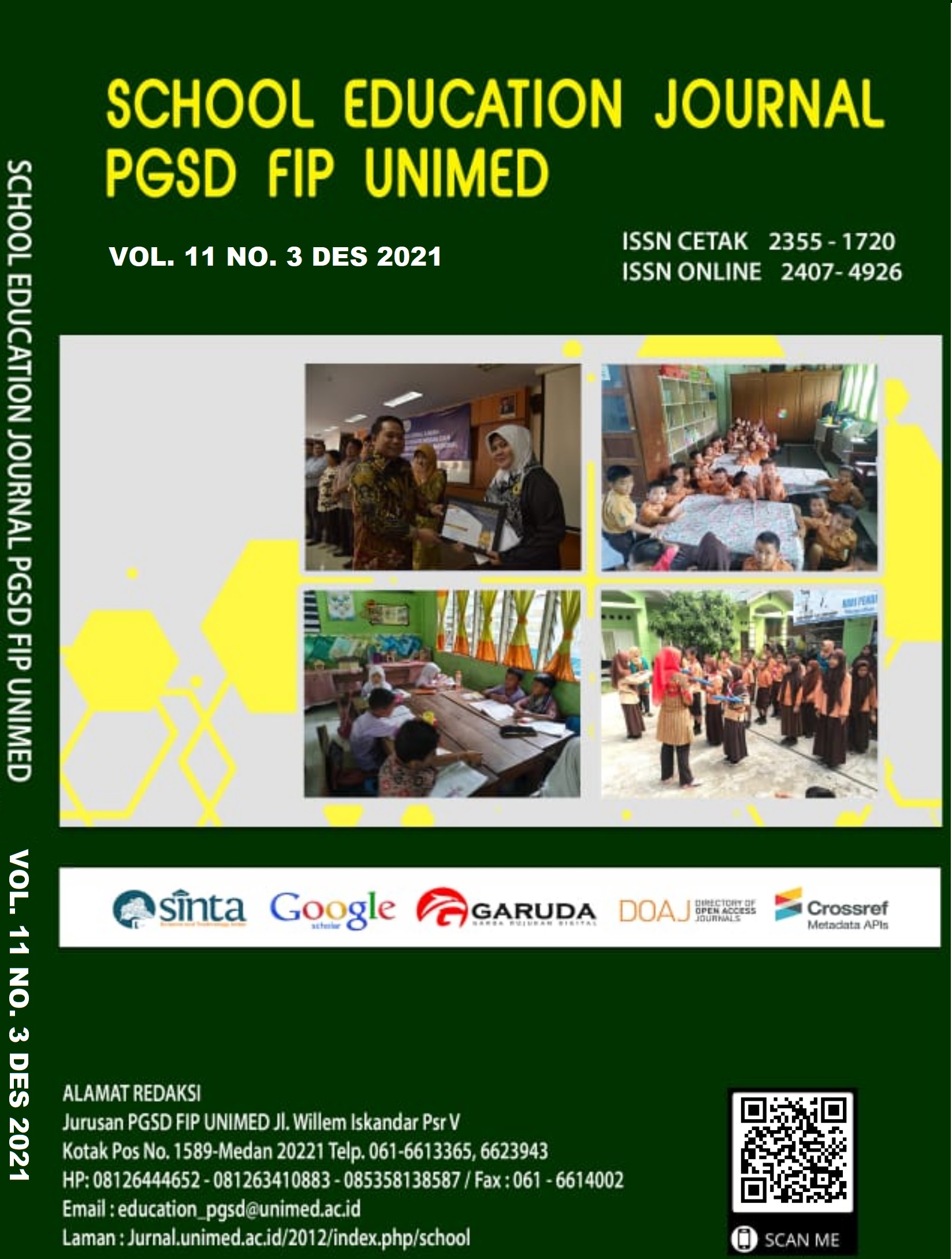PENGEMBANGAN E-MODUL BERBASIS PROBLEM BASED LEARNING TERINTEGRASI LINGKUNGAN HIDUP PADA MATA KULIAH KONSEP DASAR IPS SEKOLAH DASAR
DOI:
https://doi.org/10.24114/sejpgsd.v12i3.40748Keywords:
Development, E-Modules, Problem Based Learning, Environment, Social Science Basic Concepts.Abstract
The basic research objectives are: 1) To produce an E-Module based on Environmental Integrated Problem Based Learning in a valid Elementary School Social Sciences Basic Concept Course. 2) To test the viability of the Natural Coordinates Issue Based Learning-Based E-Module item within the Fundamental Social Sciences Rudimentary School Concept Course. The sort of investigate conducted is the sort of inquire about and improvement or Inquire about and Development (R&D). This investigate may be a investigate and advancement show utilizing the ADDIE (Examination, Plan, Improvement, Execution, and Evaluation) show. The area of the investigate was carried out within the PGSD FIP Unimed ponder program. The populace of this inquire about is all understudies of PGSD Unimed Stambuk 2021 totaling 225 understudies comprising of 11 (A-K) customary and expansion classes. The test of this investigate was carried out in a course program and one lesson was chosen, specifically Lesson J Normal 2021, totaling 28 understudies. Data collection techniques in this study using observation, interviews, questionnaires or questionnaires and documentation. The results showed that the feasibility assessment by media experts scored 87 (87%) with the "very feasible" criteria, the assessment by material experts (lecturers) scored 73 (91%) with the "very feasible" criteria. As for the results of the effectiveness assessment by class J Reg 2021 students, the change in student scores has increased, the pre-test results scored 39.28% with the "ineffective" criteria and the post-test scored 85.35% with the "very effective" criteria.References
Al-Tabany, Trianto Ibnu Badar. 2014. Mendesain Model Pembelajaran Inovatif, Progresif, dan Kontekstual. Jakarta: Prenadamedia Group.
E, Mulyasa. 2005. Implementasi Kurikulum 2004. Bandung: Remaja Rosda Karya.
Hapsari, I. I. 2016. Psikologi Perkembangan Anak. Jakarta: Indeks.
Hayati. 2022. Implementasi Hybrid Learning di Masa Pandemi Covid-19 dalam Meningkatkan Hasil Belajar IPS pada Siswa Kelas V SD Negeri 163080 Tebing Tinggi. School Education Journal Volume 12 No. 2 Juni 2022, doi: https://doi.org/10.24114/sejpgsd.v12i2.35354.
Pratomo, S. 2009. Model Pembelajaran Tematik dalam Pendidikan Lingkungan Hidup (PLH) di Sekolah Dasar. Jurnal Pendidikan Dasar Respository Universitas Pendidikan Indonesia Bandung, 11(2): 8-15.
Purba, Glory. 2021. Penerapan E-Learning Melalui Pembelajaran Berbasis Masalah Untuk Meningkatkan Kemampuan Pemecahan Masalah Matematis Mahasiswa. School Education Journal Vol. 11 No. 2 Juni 2021, doi: https://doi.org/10.24114/sejpgsd.v11i2.27203.
Purnawan. 2007. Deskripsi Model PBL. [Online] Diakses tanggal 27 Januari 2022. Tersedia: https://www.kompas.com/skola/read/2022/07/07/143000469/project-based-learning-pengertian-langkah-kelebihan-kekurangannya.
Salim & Haidir. 2019. Penelitian Pendidikan: Metode, Pendekatan, dan Jenis. Jakarta: Kencana.
Sapriya. 2011. Pendidikan IPS: Konsep dan Pembelajaran. Bandung: Remaja Rosdakarya.
Shoimin, Aris. 2014. 68 Model Pembelajaran Inovatif dalam Kurikulum 2013. Yogyakarta: Ar-Ruzz Media.
Sugiyono. 2016. Metode Penelitian Kuantitatif, Kualitatif dan R&D. Bandung: Alfabet.
Widoyoko, Eko Putro. 2014. Teknik Penyusunan Instrumen Penelitian. Yogyakarta: Pustaka Pelajar.
Downloads
Published
Issue
Section
License
Authors whose manuscripts are approved are approved as follows:
The publication rights for all journal manuscript materials published/published on the SEJ (School Education Journal) E-Journal site are held by the editorial board with the author's knowledge (moral rights remain with the manuscript authors).
The formal legal requirements for accessing this electronic digital journal article are subject to the terms of the Creative Commons Attribution-ShareAlike (CC BY) license, which means that E-Journal SEJ (School Education Journal) has the right to store, transfer media/format, manage in the form of a database, maintain, and publish articles without asking permission from the author as long as the author's name remains as the copyright owner.
Manuscripts published/published electronically are open access for educational, research, and library purposes.

